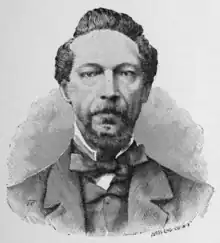Philip Alexander Bell
Philip Alexander Bell (1808–1889) was a 19th-century American newspaper editor and abolitionist. Born in New York City, he was educated at the African Free School[1] and became politically active at the 1832 Colored Convention. He began his newspaper career with for William Lloyd Garrison's anti-slavery newspaper The Liberator[1] and became an outspoken voice on a variety of social and political of issues of the day including abolition, suffrage, and the protection of fugitive slaves.
Philip Alexander Bell | |
|---|---|
 | |
| Born | 1808 New York City |
| Died | 1889 San Francisco |
| Nationality | American |
| Occupation | Newspaper editor |
| Years active | 1830-1889 |
| Known for | Opposition to slavery, support for black citizenship and suffrage in the United States |
| Notable work | Weekly Advocate, Pacific Appeal, The Elevator |
In 1837, he founded The Weekly Advocate newspaper, edited by Samuel Cornish. The paper was later renamed The Colored American and co-owned by Charles Bennett Ray. In 1860, he moved to San Francisco where he became co-editor of the African-American newspaper The Pacific Appeal. After the Civil War he founded and edited The San Francisco Elevator during the Reconstruction Era.[2][3][4][5]
Bell died on April 24, 1889.[6]
References
- "P.A. Bell: Abolitionist". www.lincolnshrine.org. Retrieved 2021-02-23.
- Perry, E.L.; Alexander, L. (2010). Encyclopedia of African American History. American Ethnic Experience. ABC-CLIO. p. 324. ISBN 978-1-85109-769-2. Retrieved February 13, 2017.
- George William Gore, Negro Journalism: An Essay on the History and Present Conditions of the Negro Press, University Microfilms, 1922
- Lara Langer Cohen, Jordan Alexander Stein, Early African American Print Culture, University of Pennsylvania Press, Sep 6, 2012
- Jan Batiste Adkins , African Americans of San Francisco, Arcadia Publishing, 2012
- Beasley, Delilah (1919). The Negro Trail Blazers of California. Los Angeles. p. 252.
{{cite book}}: CS1 maint: location missing publisher (link)